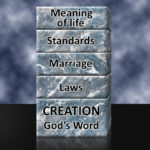 Article by Director Thomas Purifoy Jr.: Six Reasons Reformed Christians Should Embrace Six-Day Creation (original source here)
Article by Director Thomas Purifoy Jr.: Six Reasons Reformed Christians Should Embrace Six-Day Creation (original source here)
When ‘Is Genesis History?’ opened in theaters last year, we had no idea it would be the top-grossing Christian documentary for 2017. We were even more surprised when our distributor said it was bringing it back to theaters on Feb 22, 2018, for an Anniversary Event.
Why did this film resonate so much with audiences? Perhaps it demonstrated that it’s intellectually reasonable for Christians to embrace 6-day creation.
By ‘6-day creation,’ I’m referring not just to one’s view of Genesis 1, but to an entire chronology of historical events. These include the immediate creation of everything in six normal days, a Fall that brought corruption and death into the universe, and a global Flood that destroyed the world. I recognize that among some Reformed Christians this is not a popular view of history. Instead, some have adopted the framework hypothesis, analogical days, or the cosmic-temple model to interpret Genesis 1.
They then accept the conventional chronology of universal history. This includes the slow formation of everything over billions of years starting with a Big Bang, the corruption, and death of trillions of creatures before the arrival of Adam and Eve, a Fall that introduced death only to mankind, and a local flood during the days of Noah.
I realize that intelligent and godly Reformed Christians hold to this model of Earth history. Nevertheless, many seem unaware of the actual events they must inevitably adopt when affirming a 13.8 billion-year-old universe. After all, one cannot extend history for billions of years without attaching new events to it. Those events have theological consequences. This is why Reformed thinkers like Geerhardus Vos, Louis Berkhof, and D. Martin Lloyd-Jones embraced 6-day creation. They understood it is the events included in 6-day creation that are essential for Christian theology.
Here are six theological reasons worth considering:
1. God’s Goodness Must Be Reflected in the Original Creation
Ligon Duncan observed in an interview for ‘The Gospel Coalition’ that affirming the goodness of the original creation is non-negotiable. As the Westminster Confession states, the goodness of the original creation is the manifestation of the glory of God’s own goodness. (WCF 4.1)
What does that goodness look like? It is full of life-giving power and bounty. This is what we see in Genesis 1. God pronounces His original creation ‘good’ and ‘very good.’ It was a world of plenty and beauty without animal carnivory (Gen 1:30) and without corruption and death (Rom 8:21).
Yet this picture of an artistically-designed, beautiful world only fits within the chronology of 6-day creation. If one adopts the conventional chronology, one must accept that the Earth was absent from the universe for its first 9 billion years. After a galactic cooling event, the Earth slowly formed through billions of years of uninhabitable environments. God eventually created the first complex marine life, then progressively created or evolved different types of organisms. These experienced death and massive extinction events that led to the destruction of trillions of living creatures. All this happened long before the appearance of Adam and Eve.
I realize that some Christians may not be interested in these sorts of details. Yet anyone who chooses to accept an old universe implicitly accepts the historical events that go with it. It is a history filled with lifelessness and death, not the goodness of God.
2. Adam’s Sin Resulted in Universal Corruption and Death
According to the conventional chronology, corruption has always been a part of the universe. This can be seen in the fossil record which supposedly represents 540 million years of animal suffering and death. It provides snapshots of a world often full of thorns and thistles. Continue reading →
 Article by Dr. Jason Lisle (original source here)
Article by Dr. Jason Lisle (original source here) 
